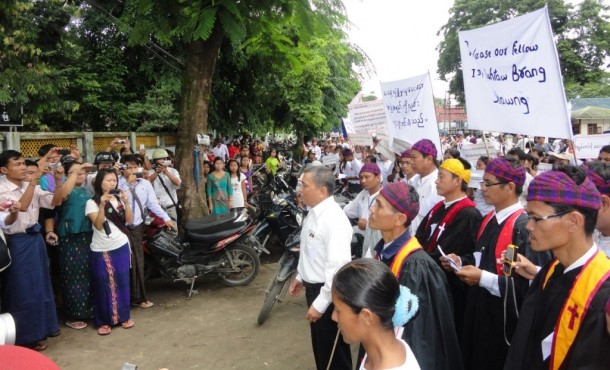RANGOON — Three ethnic Kachin men, who have allegedly been subjected to degrading treatment in the custody of the Burmese military, were sentenced to lengthy jail terms by a court in the Kachin State capital on Thursday, according to their lawyer.
Gan Yon, Laphai Gam and La Reing were arrested in the midst of fierce fighting in northern Burma in June 2012 and accused of being soldiers for the Kachin Independence Army (KIA). Their lawyer, Mar Khar, told The Irrawaddy that the Myitkyina District Court this week sentenced them to 14, 13, and three years in prison, respectively, under articles 3 and 4 of Burma’s 1908 Explosive Substances Law.
They are already serving separate prison sentences, handed down last year, of five years each under Article 17(1) of the controversial Unlawful Associations Law, the lawyer said.
The three men have consistently denied the charges and say they are not affiliated with the KIA.
Mar Khar said they were not given a fair trial, and insists that the three men are civilians who at the time of their arrest were living in the Shwe Set camp for internally displaced persons after fleeing fighting near their homes.
“I strongly object to the verdicts,” said Mar Khar. “The judges neglected the law and ignored the defense’s testimony, although the evidence presented by the plaintiff [local police] was groundless.”
The lawyer has long alleged on behalf of his clients that they were subjected to human rights abuses during their detention.
“They were badly tortured, including burning of their genitals and beatings. [Laphai Gam and La Rein] were forced to perform sexual acts on each other in front of military officials,” Mar Khar said.
A fourth Kachin man arrested around the same time as those convicted this week, Brang Shawng, was released last year in a presidential pardon after he was charged only with the Unlawful Associations Law. The Burmese government has been accused of targeting civilians in ethnic areas with the law.
The lawyer said Burma’s political leaders were ignoring human rights abuses and judicial bias against civilians. He said he has sent letters to President Thein Sein and opposition leader Aung San Suu Kyi, who heads Parliaments rule of law committee, but has received no response.
Mar Khar said such injustice persists across Burma, not just in Kachin State, where fighting between the government’s troops and ethnic rebels continues.
“I am afraid their cases will become example in others’ future trials,” he added.
















